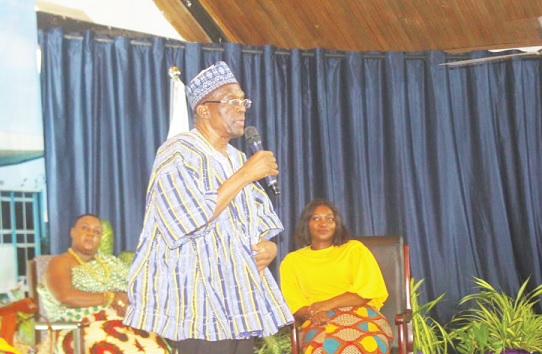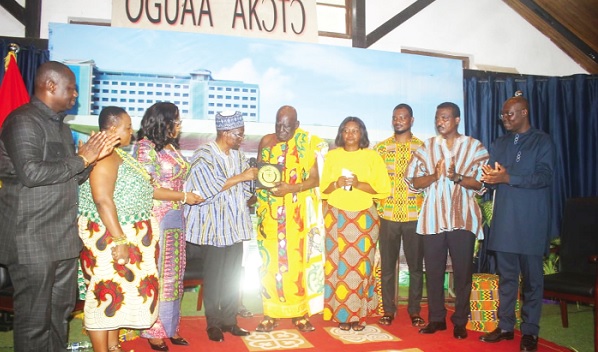
Speaker suggests quotas for underrepresented groups
Persons with disabilities (PWDs) have no representation in Parliament.
Advertisement
Also, only 40 out of the 275 Members of Parliament(MPs) presently are women, a situation which is a source of concern to the Speaker of Parliament, Alban Bagbin, who has thus suggested the creation of quotas to represent strategic groups and minorities in Parliament.
He explained that apart from the geographic constituencies, there could be quotas for minority groups to allow them to be part of decision making.
Mr Bagbin made the remarks during a courtesy call on the Oguaa Traditional Council led by Osabarima Kwesi Atta at the Emintsimadze palace last Sunday.
30 years
The visit forms part of the activities of the Speaker to whip up support for the celebration of the 30th anniversary of the Parliament in the Fourth Republic and Ghana’s return to democracy.
Mr Bagbin said the celebration and engagements were to educate Ghanaian on their heritage and ignite a sense of commitment for the country's democracy.
His entourage included the minority leader, Dr Cassiel Ato Forson, who is the Member of Parliament (MP) for Ajumako-Enyan-Essiam in the Central Region and other parliamentarians.
Also present was the Central Regional Minister, Justina Marigold Assan, as well as members of the public.
After their deliberation, the two exchanged gifts.
Providing further insight into the situation, Mr Bagbin said it was only during the sixth Parliament that PWDs had a 5.5 per cent representation, saying it was not right.
He said religious organisations, civil society organisations, traditional authorities, PWDs, the youth and women should be adequately represented for accelerated development.
“Yet you keep on saying you are a model democracy.

Alban Bagbin (4th from left), Speaker of Parliament, and Osabarima Kwesi Atta (5th from right) flanked by some dignitaries, exchanging gifts
Who modelled you?
"We are very spiritual people and yet in our leadership, we don't want the spiritual leaders to participate in our politics.
Why have we left them out?" he queried.
The Speaker, who represented the Nadowli West Constituency from 1992 to 2020, said 40 women in Parliament, representing 14.5 per cent, was not right, emphasising many countries in Africa had passed the 30 per cent of women representation in Parliament.
Also, he said the youth representation in Parliament now was under five per cent.
He further observed that the absence of these groups impacted lawmaking and subsequently, development as some groups were not catered for.
The Speaker, who during his time as MP served as Majority and Minority Leader at different times, said chalking up 30 years of uninterrupted democracy presented an opportunity to review the work on perfecting the democratic system for accelerated growth.
He said many Ghanaians did not understand democracy and it was necessary that the landmark anniversary was used to educate them to understand the tenets of the country’s democracy, which he stated, was an amalgamation of experiences from other cultures and practices.
The Speaker stressed that in spite of the imperfections of the country's democratic dispensation, a military regime should not be an option.
Advertisement
He noted that no country in the world had developed without a democracy, hence the need to review and perfect Ghana’s democracy than to go back to military regime.
" I was part of the struggle during the student days.
I was a student leader at Legon throughout the revolution and I know what went into the fight.
"I am hearing voices that we should go back to military regime.
Advertisement
If you haven't died before, at least you know sleep.
“We take so many things for granted in this country. We joke over very serious matters," he added.
Reversals worrying
Mr Bagbin also expressed concern about the spate of democratic reversals in countries around Ghana, saying it was important that conscious efforts were made to strengthen the country's democracy.
He stressed that the sustained democracy in the country was a blessing and must be protected by all Ghanaians.
Advertisement
History
Tracing Ghana's independence struggles from the 1800s, the Speaker said many people long before the Big Six, had already begun the fight for independence, however, many of these important personalities, he indicated, have not been duly acknowledged.
He said it was also necessary that Ghana's history is told in its true context, capturing all who had contributed to struggles that had brought Ghana this far.
Osabarima Kwesi Atta urged all to guard against acts that could disrupt the peace of the country.
He appealed to the Speaker to advocate for a quota of proceeds from the tourist site, the Cape Coast Castle, to be given to the traditional council.




